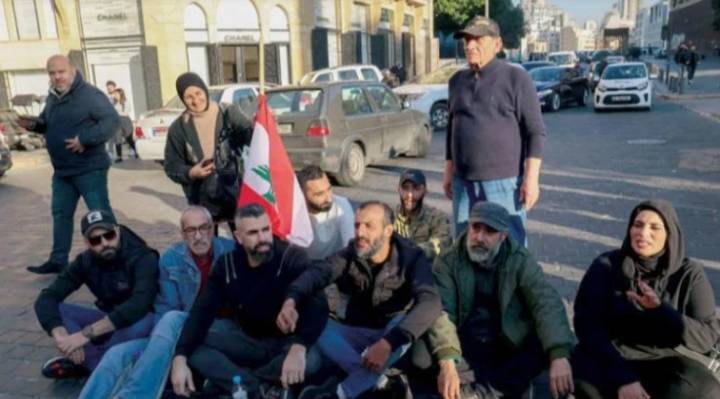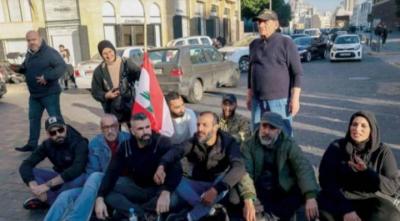The ongoing sit-in carried out by a number of "change" MPs in the Lebanese Parliament since Thursday has broken the political stalemate, yet it has not yet yielded any results, particularly concerning the presidency of the parliament. The indirect response from Parliament Speaker Nabih Berri was to refrain from scheduling a new session for next Thursday, as is customary, and instead, he convened the joint committees to meet at the same time.
While some hope that this move will stimulate activity and expedite the presidential election process and an agreement on a president, others fear it may lead to counterproductive outcomes, especially given the lack of responsiveness from the other side, effectively complicating matters further. This concern was echoed by MP George Okais from the Lebanese Forces party, who expressed his apprehension that the sit-in could lead to increased tension and Berri's intransigence in not calling for electoral sessions. He also expressed surprise at the lack of a new session being called.
Meanwhile, MP Halimeh Qaqour stated from within the Parliament that "the failure of Speaker Nabih Berri to call for a new session to elect a president indicates that he is unconcerned about the sit-in and will impose his own agenda." In a televised interview, she advocated for a logical dialogue and emphasized the need to adhere to the constitution and cooperate within and outside the parliamentary council to elect a president, asserting that there is no better forum for dialogue than the Parliament itself.
Conversely, MP Najat Saliba, who has been staging a sit-in since Thursday, does not see Berri's move as a challenge. She stated to Asharq Al-Awsat, "MPs should not wait for Berri to call for an electoral session; they must apply the constitution and remain in the council until a president is elected," affirming, "We are acting under the constitution and are prepared to confront everyone, and MPs should fulfill their duties." Saliba noted a significant show of solidarity, mentioning that 28 MPs showed up in support of their sit-in in Parliament, stressing that "this is not a minor detail, and we hope the support will grow in the coming days."
On the other hand, MP Ali Khreis from the "Development and Liberation" bloc led by Berri denied that the Speaker's decision not to set a session for next Thursday was a response to the sit-in. He told Asharq Al-Awsat, "The question today is whether we want to elect a president or remain as we are," adding, "Speaker Berri is fully aware that even if we held one hundred meetings, the outcome would be the same because the division in Lebanon is vertical and the country is bound by consensus. Therefore, he called for dialogue to reach a result and agree on a shortlist of names before heading to the council to elect a president. Any discussion outside this agreement will not yield results because Lebanon is governed by consensus, and we must maintain cohabitation."
While Khreis refuted the idea that Berri's decision was a response to the sit-in and considered calls for dialogue among all 128 MPs in Parliament impractical, he acknowledged that "at this moment, no political solutions are on the horizon in the near future."
As the sit-in by the change MPs continues to receive support from various opposing MPs, the Lebanese Forces party, through media and communication official Charles Jabour, argues that if the opposition does not unify around a single candidate, it will not achieve results. He stated to Asharq Al-Awsat, "What concerns us is to maintain pressure and intensify it against the party that is obstructing electoral sessions, namely the March 8 alliance (Hezbollah and its allies), which is preventing the election of a president," adding, "Any movement at both the popular and parliamentary levels is necessary to exert pressure on the obstructive party and unveil it further before public opinion."
Jabour clarified, "We have been clear with the protesting MPs that for the sit-in to result in desired outcomes, it must be accompanied by a unified opposition stance concerning a candidate, which for us is Michel Moawad." He continued, "We believe that without unifying the opposition with at least 65 MPs around a single candidate, it won’t produce the desired results, and we must place the other party in a position to acknowledge that there is now a possibility of electing a president."
MP Michel Doueihi expressed that "the sit-in inside the council serves two functions; the first is self-evident, which is to urge MPs to elect a president in accordance with articles 49, 74, and 75 of the constitution. The second, equally important, is to agree on a sovereign, rescue, and reformist name that all opposition blocs can rally around."
Furthermore, MP Abdul Rahman Bizri highlighted that there is a real internal opportunity that does not rely on any external or regional calculations. He pointed out in a televised interview that the MPs present in the council are not merely sit-in participants but are doing their natural duties. He added, "What we are witnessing in the parliamentary council is a genuine democratic outcry, aimed at demonstrating that the council's role is to elect a president." He argued that this step has stirred the waters, noting that it is evident that the situation is exceptional and that the primary goal is to protect the Lebanese parliamentary-presidential system.




